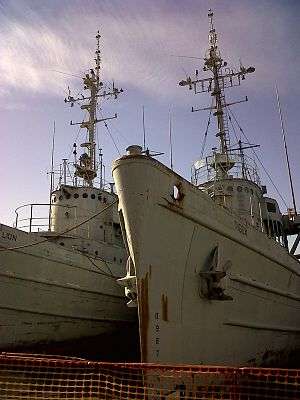Abnaki-class tugboat
The Abnaki-class tug is a class of United States Navy fleet ocean tugs which began construction in November 1942. Comprising 22 oceangoing tugboats, the class was constructed in response to the needs of World War II, but members of the class served in the Korean War and Vietnam War as well. The United States Navy no longer has any ships of this class in active duty.
_and_Soviet_trawler_Gidrofon_underway_in_the_South_China_Sea_on_18_December_1967_(K-43379).jpg) USS Abnaki (right), alongside a Soviet trawler | |
| Class overview | |
|---|---|
| Name: | Abnaki class |
| Operators: |
|
| Preceded by: | Cherokee class |
| Built: | 1942–1945 |
| In commission: | 1943–present |
| Completed: | 27 |
| Active: | 7 |
| Lost: | 3 |
| Retired: | 17 |
| Preserved: | 1 |
| General characteristics | |
| Type: | Ocean fleet tug |
| Displacement: | 1,589 tons |
| Length: | 205 ft 0 in (62.48 m) |
| Beam: | 38 ft 6 in (11.73 m) |
| Draft: | 15 ft 4 in (4.67 m) |
| Propulsion: |
|
| Speed: | 16.5 knots (30.6 km/h) |
| Range: |
6000 nautical miles (11,000 km) at 16 knots 15,000 nautical miles (28,000 km) at 8 knots |
| Complement: | 85 |
| Armament: |
|

USS Moctobi (Lion) and USS Quapaw (Tiger) in 2011
Ships
| Ship name | Hull number | Commissioned | Decommissioned | Fate |
|---|---|---|---|---|
| Abnaki | ATF-96 | 25 November 1943 | 30 September 1978 | Transferred to Mexico; currently active |
| Alsea | ATF-97 | 13 December 1943 | 15 April 1955 | Sold for scrap, 20 June 1996 |
| Arikara | ATF-98 | 5 January 1944 | 1 July 1971 | Transferred to Chile, 1 July 1971; Sunk as target, 1992 |
| Chowanoc | ATF-100 | 21 February 1944 | 1 October 1971 | Transferred to Ecuador, 1 October 1977; currently active |
| Cocopa | ATF-101 | 25 March 1944 | 30 September 1978 | Transferred to Mexico, 30 September 1978; currently active |
| Moctobi | ATF-105 | 25 July 1944 | 30 September 1985 | Sold to the Northeast Wisconsin Railroad Transportation Commission, 29 December 1997; scrapped 2012 |
| Molala | ATF-106 | 29 September1943 | 1 August 1978 | Transferred to Mexico, 1 August 1978; currently active |
| Munsee | ATF-107 | 30 October 1943 | 3 November 1969 | Sold into commercial service, 2 July 1970; scrapped 1978. |
| Pakana | ATF-108 | 17 December 1945 | 30 April 1948 | Sunk as a target, 27 May 1975 |
| Potawatomi | ATF-109 | 12 February 1944 | 28 April 1948 | Transferred to Chile February 1963; sunk, 15 August 1965 |
| Quapaw | ATF-110 | 6 May 1944 | 30 August 1985 | Sank as a result of neglect, 11 December 2011; scrapped 2012 |
| Sarsi | ATF-111 | 24 June 1944 | n/a | Sunk, 27 August 1952 |
| Serrano | ATF-112 | 22 September 1944 | 2 January 1970 | Sold for scrap, 2 November 1971 |
| Takelma | ATF-113 | 3 August 1944 | 28 January 1992 | Transferred to Argentina, 30 September 1993; currently active |
| Tawakoni | ATF-114 | 15 September 1944 | 1978 | Transferred to Taiwan, 1 June 1978; currently active |
| Tenino | ATF-115 | 18 November 1944 | 17 May 1947 | Unknown |
| Tolowa | ATF-116 | 26 December 1944 | 27 January 1947 | Unknown |
| Wateree | ATF-117 | 17 February 1945 | n/a | Sunk, 9 October 1945 |
| Wenatchee | ATF-118 | 24 March 1945 | 19 March 1947 | Unknown |
| Atakapa | ATF-149 | 8 December 1944 | 1 July 1974 | Sunk as a target, 25 August 2000 |
| Cahuilla | ATF-152 | 10 March 1945 | 27 June 1947 | Transferred to Argentina, 9 July 1961; museum ship |
| Luiseno | ATF-156 | 16 June 1945 | 1 July 1975 | Transferred to Argentina, 1 July 1975; currently active |
| Nimpuc | ATF-157 | 8 July 1945 | n/a | Unknown |
| Mosopelea | ATF-158 | 28 July 1945 | n/a | Sunk as a target, 27 October 1999 |
| Papago | ATF-160 | 3 October 1945 | 28 July 1992 | Decommissioned 28 July 1992, as of 2010 part of the Naval mothball fleet located in Philadelphia, Pennsylvania.[3] |
| Salinan | ATF-161 | 9 November 1945 | 1 September 1978 | Transferred to Venezuela, 1 September 1978; fate unknown |
| Utina | ATF-163 | 30 January 1946 | 3 September 1971 | Transferred to Venezuela, 1 December 1977; fate unknown |
gollark: You can save time by just pledging your allegiance to me.
gollark: The Internet is kind of terrible because of historical inertia (we're still on IPv4 everywhere for some reason? NAT everywhere, overzealous middleboxes, etc are very wasteful), but it generally works.
gollark: Yes, arbitrarily smart people can just derive all information via Solomonoff induction (good).
gollark: https://www.urbandictionary.com/define.php?term=apioform
gollark: Maybe you should check the abstract concept of bees.
References
- This article includes information collected from the public domain sources Dictionary of American Naval Fighting Ships and Naval Vessel Register.
External links
| Wikimedia Commons has media related to Abnaki class ocean tug. |
This article is issued from Wikipedia. The text is licensed under Creative Commons - Attribution - Sharealike. Additional terms may apply for the media files.